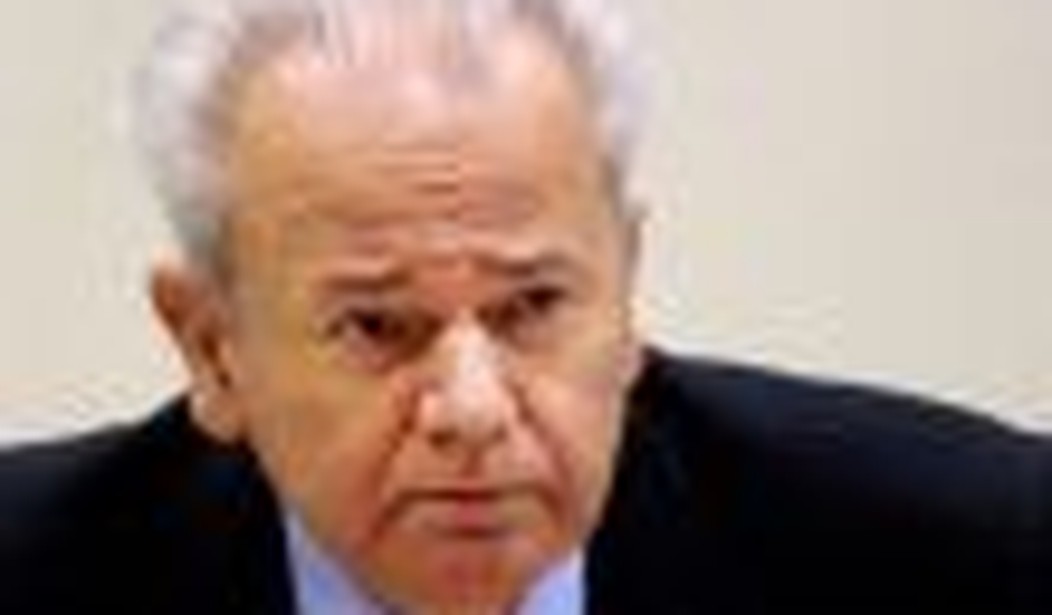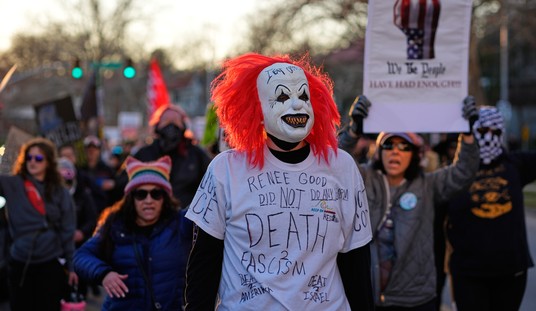On the night of Thursday, February 21, 2008, a rabble attacked the U.S., German, British, and Croatian embassies in Belgrade, Serbia. Less than a mile away over 200,000 people, peacefully protesting against Kosovo’s declaration of independence, were praying in and around St. Sava Cathedral, completely oblivious to the violence being committed in their name. That protest was ignored; the riots commanded the world’s attention.
The embassy attacks were rightly greeted with condemnation, especially in Serbia itself. The following morning the air of Belgrade was blue with curses of ordinary Serbs damning those who had attacked the embassies and brought shame to Serbia.
The people of Belgrade were particularly hurt by the events of that night. Belgrade’s growing reputation as “Europe’s best-kept secret” was in tatters. The jewel of Eastern Europe, the London of the Balkans, a Mecca for clubbers and in-the-know travelers, was now just another Balkan trouble spot.
Serb-hating pundits were now triumphantly touting the riots as evidence that Serbs were unfit to govern Kosovo and that nothing had changed since the time of Milosevic. Serbs, it was argued, are violent, murderous thugs and the riots prove it.
That violent night was a grim micro-history of post-Cold War Yugoslavia. Yet again the wrongful acts of an unrepresentative minority of Serbs had commanded the attention of the entire world and generated undeserving condemnation of the people of Serbia. Serbophobia — a virulent, truth-resistant strain of racist chauvinism and bigotry that riddles the American and European body politic — was given a powerful boost that night.
For the last 15 years decent Serbs have been in exactly the same position as that of decent Muslims since 9/11. In the case of Muslims the actions of Islamists and other terrorists acting in the name of Islam have led to the majority of Muslims — completely innocent people — being unfairly branded as extremists and mass murderers.
Both the Serbs and moderate Muslims are expected to take the blame for acts committed by maniacs claiming to represent them. Jews are also very familiar with this problem. Since 1948 anti-Semitism has been given extra impetus by the situation in Israel and Palestine. The alleged crimes of Israel, often fabricated and exaggerated beyond recognition, are attributed to Jews everywhere. Islamophobia, anti-Semitism, and Serbophobia are all thriving together, powered by the same type of myths, simplifications, ignorance, and falsehoods that animate all bigotry.
In the Serbs’ case the injustices do not end at mere hatred, slander, and unpopularity. An anti-Serb media bias, combined with a one-sided account of Bosnian war crimes, has resulted in the very word “Serb” conjuring up stereotypical images of rampaging militias, mass rape, sniping at besieged civilians, refugee columns, and ethnic cleansing.
The fact that all sides committed atrocities during the Balkan wars, and that the Serbs also suffered terribly, is obscured by the West’s unbalanced focus on Serbian war crimes in both the media and the ICTY, the International Criminal Tribunal for the former Yugoslavia. The Western media have consistently under-represented or ignored crimes against Serbs, while uncritically reporting even the most ludicrous of anti-Serb allegations.
Take for example the U.S.-planned and supported “Operation Storm,” where in 1995 around 200,000 Serbs were ethnically cleansed from Croatia. Not only is this war crime virtually unknown in the West but it is celebrated as a national holiday in Croatia. I would estimate that more Serbs have been permanently ethnically cleansed in the former Yugoslavia than all the other ethnic groups put together.
I believe that most Serbophobia and the myth of Serbian guilt is based on what British journalist Nick Davies calls “flat earth news.” In a new eponymous book on the subject he defines flat earth news as a story that appears to be true and is widely accepted as true, such that eventually it becomes a heresy to suggest that it is not true — even if it is riddled with falsehood, distortion, and propaganda.
I believe most of what people of the West believe about Serbs is based on flat earth news.
Even though the truth contradicts the myth of the Serbs as the Balkan panmalefic, the myth persists in the West, where it fuels Serbophobia and serves as justification for today’s unjust policies towards Serbs and Serbia. Justifications for the bombing of Serbia in 1999, the consequential annexation of part of its sovereign territory, and the unilateral granting of recognition to Kosovo are all rooted in the myth of Serbia as the Balkan panmalefic. They are all based on falsehoods, distortion, and propaganda — in other words, flat earth news.
People often ask me, “How did Kosovo happen?” Once they learn the truth — normally after visiting Serbia — they want to know how the UN, U.S., and EU — traditionally enforcers of international law — came to reverse 60 years of diplomatic precedent and are now trying to change the borders of a sovereign democracy and create an inviable ethnic nationalist micro-state. They want to know how NATO, a defensive organization, came to carry out an offensive war against a civilian population based almost entirely on the allegations of a terrorist organization. They also want to know why the wrongs of 1999, now established as wrongs, have not been acknowledged and righted.
I can tell you what the majority of Serbs believe, even if I cannot present the evidence of their case in one article.
The Serbs believe that Kosovo independence is part of a “Greater Albania” project, which is nearly identical and at least as dangerous as Milosevic’s ill-fated “Greater Serbia” project, which was responsible for so much suffering in the former Yugoslavia. They believe that Kosovo is just the start of this project and that the Albanians of Macedonia and Montenegro will eventually seek to join a Greater Albania too, using Kosovo as a precedent.
They believe that the terrible reputation of Serbs generated by the acts of Serbian war criminals and aggravated by Western media bias (flat earth news) gifted the KLA (Kosovo Liberation Army) their grand strategy for creating this Greater Albania, namely: fool NATO into attacking the Serbs to force them out of Kosovo and do this by convincing the world that the war crimes of Bosnia are being repeated in Kosovo.
Serbs believe that the KLA, in combination with the U.S. Albanian lobby, teamed up with the Clinton administration and set about convincing the world of this lie. It was a successful strategy.
Serbs consider NATO’s justifications for the bombing to be not only baseless, but in some cases absurd. Serbs believe the disinformation machine we saw operating so effectively over the second Iraq war was also deployed against the Serbs to support an illegal war also based on pretexts and lies.
Serbs consider the Rambouillet “peace conference” to be a sham. They were presented with terms that bore a striking resemblance to the terms Hitler presented to them in 1941, namely that NATO forces could travel and deploy anywhere in Yugoslavia as an occupying power — something no sovereign state could allow. Serb refusal to accept these terms was presented as intransigence, even though the Yugoslav assembly had accepted the non-military parts of the agreement, including full autonomy for Kosovo.
Today a consensus is emerging that the putative crimes against Kosovo Albanians were indeed grossly and deliberately exaggerated by the KLA, probably to dupe NATO into attacking Serbia. In the light of history, the justifications for NATO’s war against Serbia do indeed seem as baseless as the WMD case against Iraq. Even the mass exodus of Albanian refugees — a sight that symbolized the conflict — is now suspected of being a KLA-orchestrated media stunt (although I have yet to see proper evidence of this).
This growing consensus is partly due to the Iraq war. Our attitude to government spin, misinformation, and lies has been transformed by that conflict. It is not just the propaganda elements of the Iraq situation that illuminate Kosovo, but there are also striking parallels between Iraq and Serbia that highlight the double standard applied to Serbia: the Kurds of northern Iraq.
The Kurds suffered terribly under Saddam Hussein’s regime. He even used nerve gas against them as part of his brutal oppression. When Saddam was forced out of northern Iraq in 1991, Iraqi Kurds enjoyed 12 years of full autonomy protected in their no-fly zone, until they were reintegrated into the national government after the fall of Saddam Hussein in 2003. They remain very much part of Iraq and no one is even considering giving them their own country, even though they want it.
In 2000, when the Serbs liberated themselves from Milosevic after nearly 10 years of mass protests and resistance, they immediately set about establishing a stable liberal democracy, which is an exemplar of pluralist democratic governance. Serbia has some of the most forward-thinking and enlightened policies on human rights, legal reform, sustainable economic development, and the environment. In Serbia today minorities are protected and safe — ask the Roma refugees from Kosovo. Foreigners are both welcomed and treated extremely well by ordinary Serbs. Extremist parties are remarkably unpopular, especially considering the political climate. For the last five years the economy has been thriving and Serbia has been marching steadily towards hard-earned EU membership.
Did their autonomous separatist region get reintegrated into the national government after liberation? We know the answer: no.
What has been the Serb’s “reward” for reforms, compliance, and liberation from tyranny? It is to be treated exactly the same way that they have been treated since the end of the Cold War: slandered by hypocrites, bullied by superpowers, judged by a double standard, and blamed unfairly even when they are the victims.
It is no wonder the Serbs are exasperated, angry, and emotionally exhausted. Given the scale of the wrongs against them, the embassy protests were tame. Those riots took place in front of bombed-out ruins of government buildings destroyed by NATO’s unjust bombardment. The rioters were the children of people ethnically cleansed from Kosovo when the armed forces protecting them were forced out. How harshly would the world judge America if a few hundred people (out of 200,000 protesters) attacked the Saudi embassy across the road from Ground Zero?
The decent people of Serbia, the people who have struggled to build a modern inclusive democratic Serbia, remain trapped between the fury of a lost generation at home and a hostile world beyond. They are a people powerless to change their painful past, unable to accept the injustices of the present and facing what appears to be a grim future as either Russia’s vassal or Europe’s whipping boy.
A symbol of the Serbian predicament is the 19-year-old who died in the U.S. embassy fire started by the rioters. He was one of the attackers, sure, but he was also one of the hundreds of thousands of Serbian refugees from Kosovo, ethnically cleansed by Albanian violence and now living in poverty in Serbia. He died for nothing, impotently venting his fury at the countries that wronged him and his people, watched by an unsympathetic world that continues to blame and malign the very people it has wronged.
Jonathan Davis is an Irish management consultant who lives in Belgrade, Serbia. He is founder of the Belgrade Foreign Visitors Club and regularly comments on Balkan matters at his personal blog, LimbicNutrition.








Join the conversation as a VIP Member